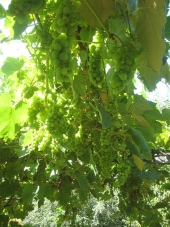Randy Bachman wrote:I inherently flinch at "who is the best" or "who is boss" type questions. One of the reasons I am drawn to permacuture is that it is a culture. No one is in charge of culture, no one decides what is "in" and what is "out". The simple rule that honors [one of the] founders - Mollison, by taking a PDC is about all I would want to see. Not because it is a "have to" but because culturally it is a way to honor the honorable, and to keep a tradition that makes the community strong.
I agree with you Randy. I would love to see a 'catalog' of what people are doing and who in innovating using various patterns, strategies and techniques in different climate types. at the same time, I doubt I will put time into creating such a list or database. permacultureglobal.net is a tool created by PRI that can serve this function if we use it well. both a map and user-updateable sites for people and projects.
i personally wouldn't put myself on the list of bigs, although I'm honored that Paul mentions my name. I continue to be grateful to be following in the footsteps of giants and graced with the connections and inspirations those kind people share with the world.
Permaculture is such an all-encompassing systems design science, that it is tough to say what is not Permaculture or at least would be excluded from the tool kit.
I would definitely consider Joel Salatin a Permaculturist and perhaps the most successful in North America. The Holistic Management movement has an amazing set of tools to compliment Permaculture and there are hundreds if not thousands of practitioners nationally.
So many doing great work and I support all the other nominations mentioned on this thread. people I know or know of that I would add to the emerging list of leaders, innovators, edge pushers and such are:
Owen Hablutzel
Craig Sponholtz
Kaitlin Bergman
Ethan Roland
Iginia Boccalandro
Penny Livingston
Brock Doleman
Erik Ohlsen
Nate Downey
Starhawk
...
and I'm sure there are dozens and dozens to add to the list, people whom I do not know or know of even, probably several others I do know should be on it as well. Everywhere I go I meet enthusiastic, well informed, permaculture experimentalists who are doing and learning and even making a living off of their endeavors of helping others and the earth. If we can increase our beneficial functional connections to each other and support the work we are all doing, we can get more examples on the ground running, learn more from our experiments and continue to store water and carbon in the lush productive human landscape.
I also think a new model is emerging where we all share the responsibility of leadership and have the opportunity to let each other lead when conditions shift and change to best compliment our human conditions.
So many of the issues we are concerned with as Permaculturalists also concern natural resource managers, fire districts, ecologists, agriculturalists, the BLM, renewable energy innovators and installers, and more. How can we develop these connections to improve and inspire ecological development towards bioregional resilience? Can we define pathways towards working with the people already on the ground and invested in the ecology where we integrate fire management, "invasive" weeds, water retention, flood protection, erosion control, productive human landscapes and economies and vibrant wildlife habitats? I think the Quivira Coalition work on this thread and Brock Doleman's OAEC Water Institute are vital examples towards moving forward on this pathway. Also, the Seattle food forest in a public park. and I'm sure there are and will continue to be more encouraging works.
I believe we are in a new regime state in the permaculture movement in N. America and worldwide, where the Pioneer species have really developed soils and water and even ecologies to support our emergence and development at a larger and more interconnected scale. For which I want to express my deep gratitude towards those who have laid these foundations, who have traveled internationally to share their experience and wisdom, to the people here who catch store and cycle that experience, to those who have stayed in one place and developed model sites, who have continued to push the edge and innovate, and to those who are just now germinating into the world of permaculture and regenerative earth living.
Paul thank you for continuing to document, to question, to share and conversate, to connect us and weave together our stories of hardship and joy.

 1
1




![Filename: permies.png
Description: [Thumbnail for permies.png]](/t/17707/a/6148/permies.png)








 1
1

















 2
2








 1
1
















 1
1




 1
1




 3
3












 2
2















